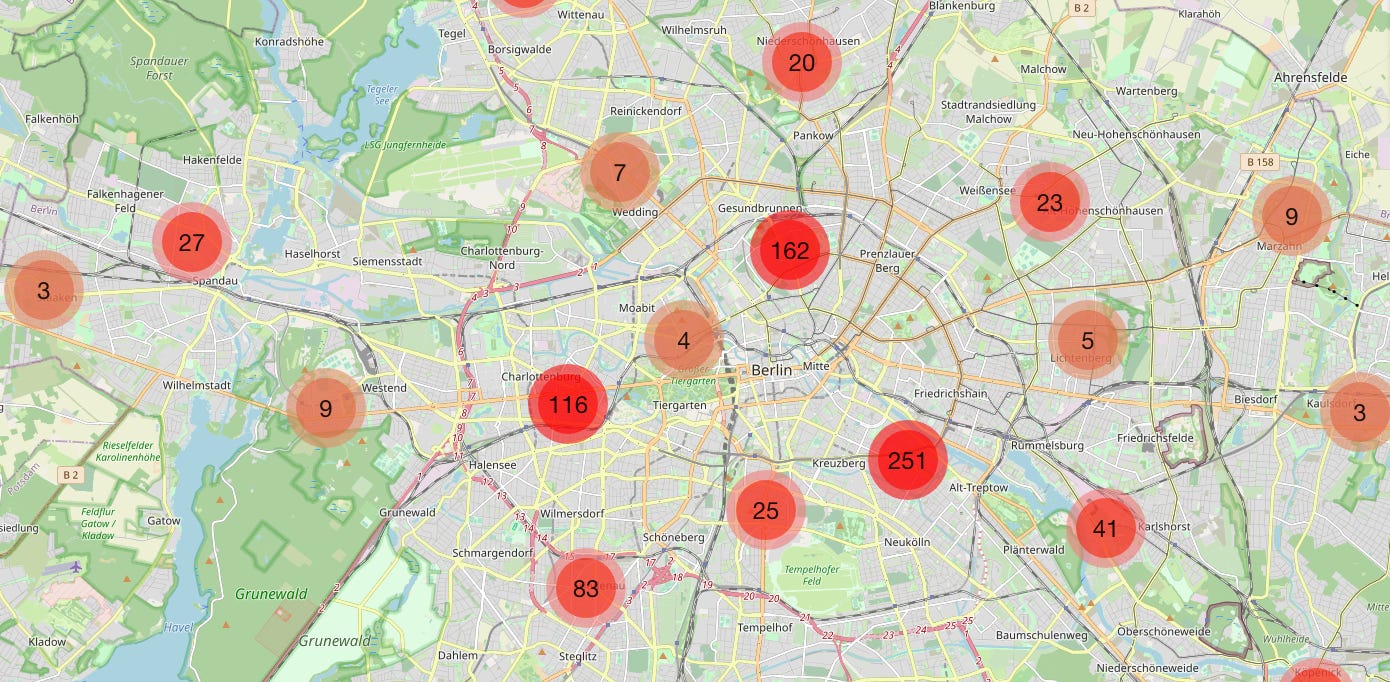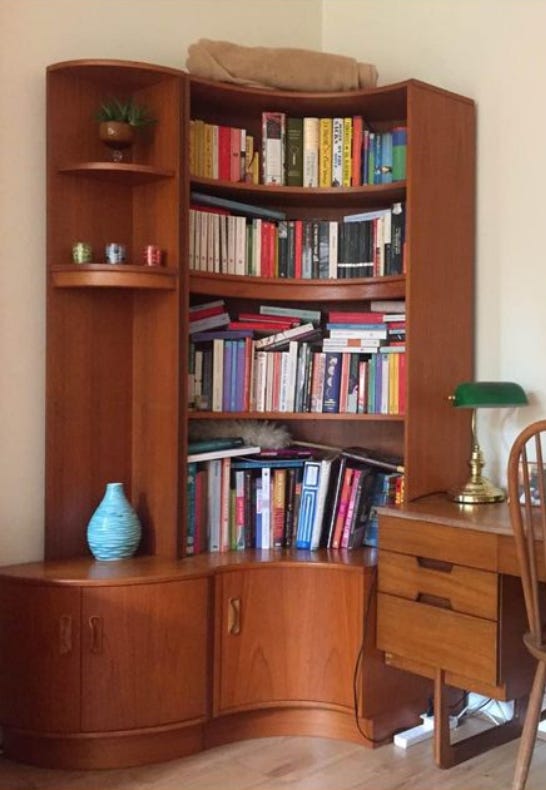Recently, on a long walk across town, I stopped at a newly-built building that is as tall as a football stadium and practically just as long. The offices therewithin had long since emptied, if they’d even been occupied at all during the day—it was the early evening and the streets were quiet. Through the dark of the night, you could still make out every individual desk and chair. I was struck by the contrast: During the day, I thought, there must be so many office workers bumbling from room to room like little colorful pixels behind the glossy glass screen of windows. These workers flood the streets at lunch time, turning the local Lidl into their break room.
I imagine that during the day, the office must feel like a train station at rush hour. But at night, the building commandeered the street in its mass, and with its stillness instead. Standing before the building’s vacancy, I became acutely aware of exactly how much time, energy and space went to building and maintaining a hub that only functions for a few hours of the day. The building’s tenancy is loud and distracting during the day; at night, the building’s tenancy is almost suffocating.
The haunting feel of vacancy is a global phenomenon, but for a myriad of reasons. Last summer, a cab driver on Gozo told me that the many vacant lots and apartment buildings were investment properties to store cash deposits in lieu of savings account. “If you have 10,000€, you buy a stable,” she said, “and if you have a million, you buy an apartment”.
In some parts of Portugal, vacancy is rooted in inheritance law: When I visited Porto last spring, an architect told me that the sale of inherited properties like those that lay vacant in Porto often involves a unified consensus amongst all co-owners. As deliberations drag on, the flats are then left to spiral into disarray, slowly crumbling behind their street-facing facades.
In other cities, the feeling of vacancy is more urgent. Last month, writer Lane Brown looked into NYC “warehousing”, a practice through which perfectly fine apartments are withheld from the market to artificially drive demand. Landlords argue that these apartments are untenable, according to Brown, and that the cost of required renovations couldn’t be recouped due to rent-stability and pro-tenant policies like the Housing Stability and Tenant Protection Act. Instead, renters as a whole pay the price for the artificial shortage that these vacancies create. This feels unfair in theory, and it’s even more stomach churning in practice: As Brown points out, algorithmic services like RealPage can help letting companies drive rents through the roof without needing to rely on withholding stock, anyway.

Sometimes, I browse a map of allegedly warehoused apartments in Berlin on Leerstandsmelder (Vacancy Reporter), a project based out of Hamburg through which over 900 vacancies have been registered in Berlin alone. Here, residents can submit vacancies in their building or buildings nearby. These submissions are then processed into a heat map of the city’s vacancies like the one above. Often, they’re vacancies that I’d never have noticed by walking through the neighborhood.
There’s a horror story-like quality to the posts on Leerstandsmelder. One submission from Sunday reads:
This house was purchased about 1.5 years ago by an investor who wanted to build approximately 1000 condominiums, and who wanted to get rid of the existing house and garages. But when it came out that the house was registered as a historic monument, nothing more was done to the house.
Unfortunately, the tenants have all been kicked out and the house is just empty
Another one from last Friday reads:
Strategic vacancy.
To benefit the sale of the house, 35% of the 2016.23 m² of living space is empty.
And yet we live amongst these vacancies, and in their shadows every day. We’re haunted by them when we weigh up our options, which are similarly artificially constrained by the housing shortages with which we live: Should I get a cat, or wait til I move house? Is this house big enough to have a child, or to even start a family? Do I love my partner, or do I hate paying full rent? These are the questions I hear people that I love ask themselves all the time, and they’re questions I imagine I’d hear far less if affordable housing was a system to navigate and not an Everest-sized hurdle to clear.

They’re questions that haunt me as I weigh up my own options as well: I love my apartment dearly, and remember the Sisyphean struggle required to get my name on its lease. But I know it’d be too small for even two adults, and that if I were to ever settle down with someone, I’d have to look elsewhere to build a home together. I love the life I have here, and I’m not keen to give up my own space anyway, not now or anytime soon. But what if that’s the dealbreaker, a need to be met for a relationship to be sustained as it has been for a handful of friends? I can’t imagine what I’d say, and it’s a horrifying thought regardless: That the outsized shadows of these vacancies have haunted some of the most intimate corners of my life.
That’s not to say I’m without hope: Portugal’s cabinet approved a package of measures that included “[forcing] owners of vacant homes across the country to make them available to long-term renters” to address the short stock of affordable rentals. It’s already been challenged as unconstitutional by critics, including the president of the Lisbon Property Owners’ Association (lol). But it’s a step in the right and necessary direction: To think of property as a place for people, not an asset to leveraged or even withheld. To think of the house as a home, or a place for a home. To remember that we might be haunted by these vacancies now, but not forever.
What I’m Working On: I’m in the early stages of a few pieces at the moment, but nothing I can share just yet. I did recently join Berlin Writer’s Workshop as a visiting faculty member. Book us for an in-house workshop or team day – we’ll have fun.
What I’m Reading: I started Little Weird last week, and I’m finding it hard to push through, surprisingly, as I love Jenny Slate. I’m in the first half of the book, though, so I’m not passing any concrete judgements just yet.
What I’m Watching: I’m working my way through Fresh Meat as part of a deep dive into how Charlotte Ritchie (Kate from You; George in Feel Good) makes such appallingly wealthy characters deeply sympathetic and likable. I also (finally) upgraded to a monthly cinema membership with Yorck Kinos but haven’t been able to use it just yet as the workers have been striking for fair conditions. Any tips on what to see?





